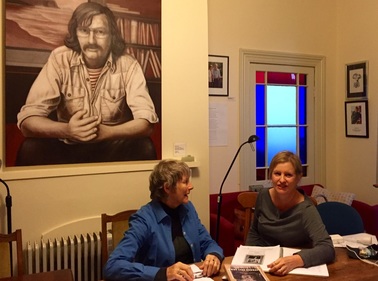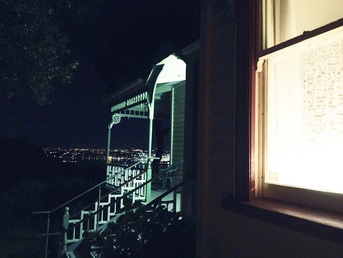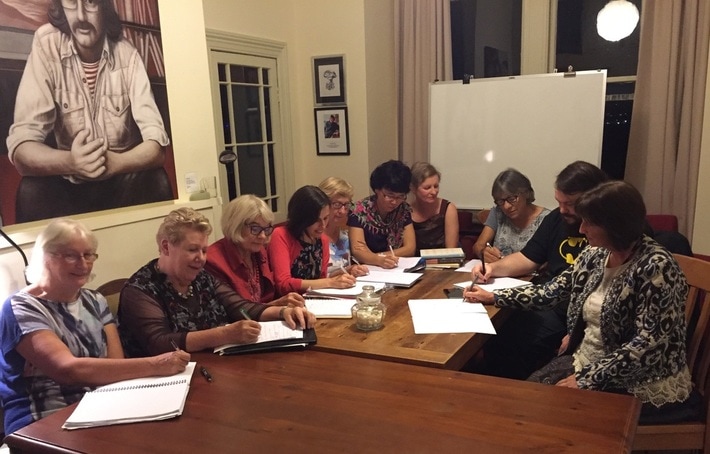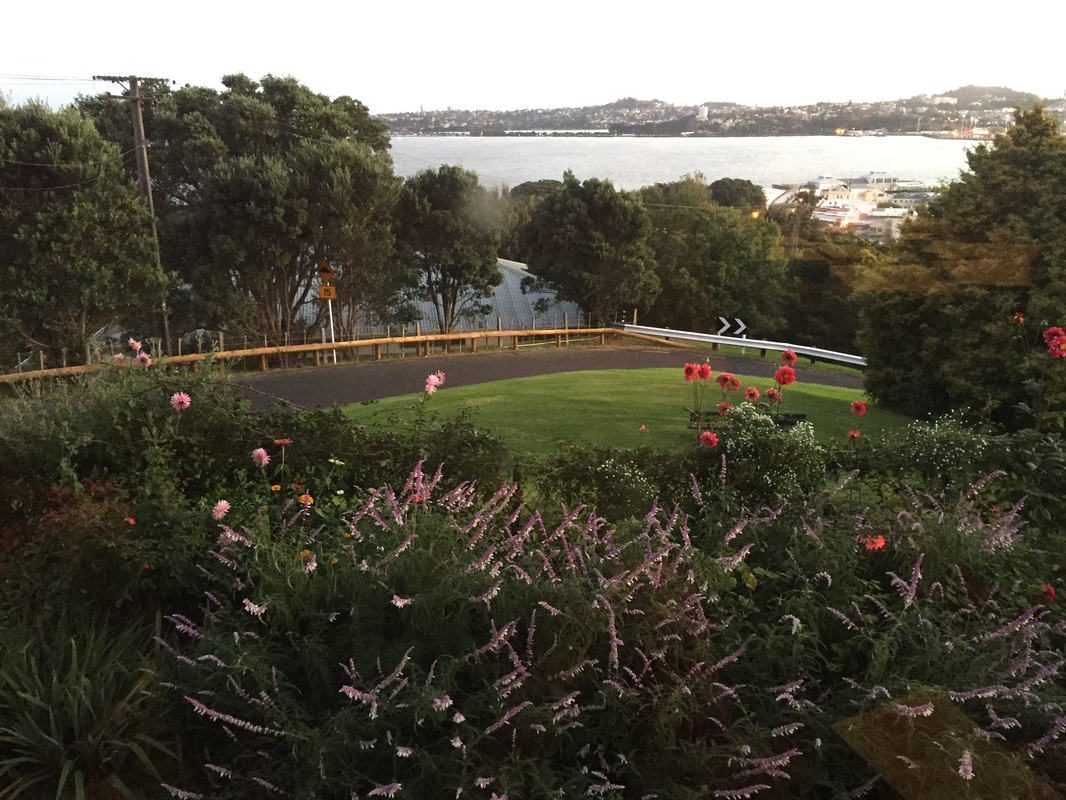|
On the final evening of the 2016 Master Classes in Memoir, at the Michael King Writers Centre, I sat in the sitting room, beneath the portrait of New Zealand historian and biographer Michael King by Annette Isbey, and observed nine writers, their heads bowed in concentration, hands moving swiftly across the white page, writing with the timer on, fifteen minutes only, writing rapidly, as I have trained them to do, free of the censor judging their work, because they know that when the timer rings there will be additional time, immediately, to edit what they have just written. The only sounds in the room were the rubbing of pens over paper and the fridge humming in the kitchen next door. Below in the garden mutabilis roses were still flowering in May amongst the pale purple and lilac velvet flowers of salvia Leucantha and the spikes of orange and pink dahlias while over the sweep of grass, above the road that winds down the volcanic cone of Takarunga, I could see the city shining across the slick of black water that is Waitemata harbour at night. Again and again I feel the magic of this special setting.  Elspeth Sandys discussing her memoir What Lies Beneath (2014) Elspeth Sandys discussing her memoir What Lies Beneath (2014) I thought then about Michael King, who had dreamed of a centre for non-fiction writers, and how he would be astonished by the outreach and achievements of this place dedicated to his memory, by the stream of authors, poets, biographers and playwrights; Geoff Chapple, Diane Brown, Eleanor Catton, Vincent O’Sullivan, Ian Wedde, Rachel Barrowman, Peter Wells, Michelanne Forster, Judith Bryers Holloway, Roger Horrocks, Briar Grace Smith to name just some of the list of outstanding New Zealand writers who have developed their manuscripts under the ideal conditions of this residency; by the classes for aspiring school age writers and the residential weekends on different aspects of writing and publishing. I think if Michael King was listening in on the Master Classes he would certainly add his opinions to the discussion of autobiography and be interested in the tales of childhood, of the defining events that changed us, the portraits of people who touched us, ruined us, mentored us. He’d have more to say at the session on ethics for he wrote a book on this topic Tread Softly For You Tread On My Life (2001) and he’d have been enchanted, as we all were, by autumn resident Elspeth Sandys discussing, at the second session, her brilliant memoir, What Lies Beneath. When people enrol on my memoir or life writing courses they’ve read the programme outline but they can’t entirely anticipate what lies ahead. At the first session they arrive feeling slightly nervous but quickly they respond to the guiding principles and values set on that first night and begin to feel comfortable. At times people have said this course is not for the faint hearted and yet each individual brings a wealth of life and work experience to the table and very soon the writers are engaging deeply and giving themselves up to the experience. I hope they are rewarded and enriched and surprised by their own capacity.  The MKWC at night The MKWC at night By the final night the writers have journeyed a long way in their understanding of the memoir genre. They’ve written a total of nine pieces over six weeks on topics such as: my whakapapa: my place in the human continuum, a childhood memory in close-up, a defining event: the day I grew up. They’ve written a biographical portrait and explored ‘The Road Chosen: a theme that links my narratives’ and finally a reflective piece ‘Turning Inward, Turning Outward’ that derives from the opening pages of Isabel Allende’s memoir The Sum of Our Days (2007). At the last session we celebrate the online publication of the best stories written on the course. This new collection of writing explores relationships with significant people; a young Scottish man sits with his dying grandfather and remembers the things they did together — picking berries, random trips in his granda’s old car, watching wrestling, drinking tea from grey and white cups; another writer describes her grandfather, the mayor of Sumner, who lost his mother when he was a young boy growing up in Scotland when she popped out to the shops and was never seen again; a niece writes warmly about a beloved uncle, the veteran of a terrible war, a respected elder and the maker of shortbread, ‘fat, sugary and delicious.’ There are stories about traumatic incidents in early childhood, the loss of a home, burnt to the ground, a visit to prison to see a parent and the feelings of awe and terror. An author, now a grandmother, discovers an old, yellowed photograph revealing four generations of women and is overwhelmed seeing her mother, the baby on her grandmother’s knee, because she lost her mother early. Another writer remembers her first day at school in an austere, forbidding Victorian Gothic building in Cornwall and, in a state of numbness as the reality sinks in, realises ‘so this is school and it is where I have to go.’ Another memoirist writes about motherhood and the joy of her firstborn’s arrival and then the growing anxiety as doctors seek to diagnose a medical condition. Her portrait of her brilliant daughter is a moving celebration of a young woman’s talents and bravery. To read these stories in full go to the Your Stories tab on the banner at the top of this page. A few days following the conclusion of the Master Classes one of the writers emailed the group to say he was feeling bereft, as Tuesday night approached, to realise we wouldn’t be meeting to continue the writing begun on my course. And then he thanked the group: ‘I heard stories from you all that made me laugh, cry and just about every emotion in between. It was touching that so many people felt able to tell such difficult stories and I think that shows the degree of respect we all held each other in.’ Postscript Tonight, as I write this account from Wellington, above another dark and shining harbour, where I have spent the past three days interviewing Fiona Kidman for a book about ‘The Writing Life: Twelve New Zealand Authors,’ I find myself wanting to respond to the writer who was feeling at a loss, without the structure and companionship of the memoir sessions. During the conversation Fiona talked about the experience of teaching writing in this country and together we discussed a quotation from her second volume of memoir Beside the Dark Pool. I offer now a call to arms from this very great New Zealand author to all writers who choose to follow the writing path and find the journey solitary and at times a little uneven and rough; So you want to be a writer. Well you must learn to live with yourself, however difficult that might be at times, because you’re on your own in this job; you need to make space in your life, settle on your priorities. A writer’s life is not spent in an ivory tower. Learn to accept that real life is full of interruptions. You have children? Yes, of course, many of us do. Write for fifteen minutes a day — it’s better than nothing at all. No, I agree, this is not about craft and style, but it’s about how to survive, which is the best I can tell you right now. Can I guarantee this recipe for success? No, no of course not. Nothing is certain. Forgive me, I have to leave now. Fiona Kidman, Beside the Dark Pool (2009). Comments are closed.
|
Testimonials
"This is such a worthwhile course where emotional safety and student growth in writing are paramount." – Marilyn Woolford Categories
All
Date
April 2024
|


 RSS Feed
RSS Feed